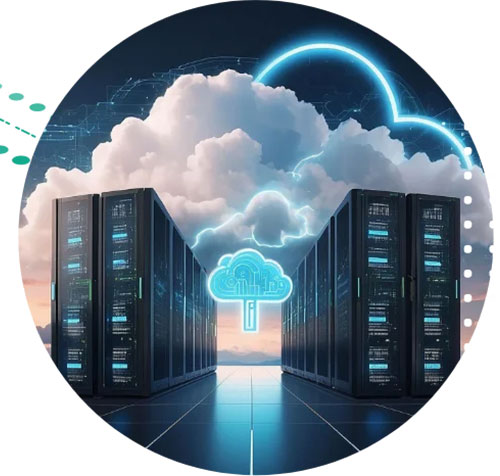Public cloud has witnessed increasing application in the modern business world giving them a way to scale, innovate, and reduce overall cost. Public cloud, in essence, is a term used for cloud computing services that are offered over the public internet and can be accessed by anyone who wishes to purchase the same.
No matter the size or scale of business, public cloud extends a flexible and powerful solution for enterprises to modernize their operations.
By understanding its key features and benefits, you can make informed decisions about integrating this technology into your growth strategies. Let us take a look at what the public cloud is, its unique advantages, and how it can drive your business forward.
What is Public Cloud?
A public cloud is a model of cloud computing under which third-party providers deliver IT resources such as compute, storage, and networking over the internet. This differs from conventional on-premise infrastructure, that may come with high procurement, deployment, maintenance, and upgradation cost. The public cloud model offers services that are accessible on-demand, and scalable to any business need on a pay-as-used basis.
Public cloud providers maintain globally distributed data centers, handle hardware, software, security, and licensing, and allow businesses to access these resources via the internet without the need for in-house infrastructure. Additionally, the public cloud enables organizations to leverage it for advanced technologies such as AI, blockchain, and large-scale analytics without having to pay high setup and maintenance costs. This democratization of technology enables faster innovation and better customer satisfaction.
Sify’s managed public cloud services offer carrier-grade unified threat management (UTM) infrastructure that also comes with superior backup services like disaster protection and data backup and storage. Explore more today.
Key Features of Public Cloud
Top 5 key features of public cloud are:
- On-Demand Availability
Public cloud resources are available on demand as infrastructure as software just in time. This means businesses can access IT infrastructure resources at any time depending on their workload needs through automation. - Scalability
From seasonal traffic peaks to growing user bases, public clouds can scale up as per workload without any performance degradation. - Global Reach
With the growing presence of data centers globally, public cloud solutions ensure low latency and a better user experience. - Multitenancy
The shared infrastructure of public cloud services optimizes resource usage and thus ensures cost efficiency for all users. - Automation and Integration
Public cloud providers provide APIs and automation tools that simplify resource management and integration with existing systems.
Benefits of Public Cloud
Some of the notable benefits of public cloud include:
- Cost Efficiency
Public cloud services operate on a pay-as-you-go model, thus saving businesses from huge upfront investments in hardware. Moreover, flexible pricing models such as free tiers and committed-use discounts that further help optimize costs. - Scalability and Flexibility
With unlimited resources present virtually, the public cloud enables businesses to scale operations seamlessly based on demand. For instance, an e-commerce platform can handle seasonal spikes without investing in additional infrastructure using public cloud solutions. - Reliability
Public cloud providers heavily invest in infrastructure. Thus offering redundancy, high uptime, and disaster recovery capabilities. Other key features like automatic backups ensure data resiliency. - Faster Innovation and Time to Market
Offloading the maintenance of infrastructure to the cloud provider frees up businesses to concentrate on innovation. Cloud providers have prebuilt tools and services accelerating the development and deployment of new applications. - Sustainability
Public cloud service providers leverage economies of scale to ensure energy efficiency and invest in renewable energy. Since the resources are shared, carbon footprints for businesses are minimized, and this leads lower CO2 emission levels. - Enhanced Security
Public cloud service follows strict compliance standards. Public cloud services use data encryption, access controls, and regular audits for security purposes. The shared responsibility model ensures that both users and providers play a role in securing data.
How Does the Public Cloud Work?
Public cloud uses a multi-tenant model where several customers share the same infrastructure. Here’s how it works:
- Data Centers
Public cloud providers manage massive networks of data centers that contain physical hardware such as servers and storage devices. These facilities are designed for their high availability and resilience.
Read about data center - Virtualization
Virtualization technology facilitates a single physical server to host numerous virtual machines (VMs) with the specifications of computing and storage as needed by the users, each with its own applications and operating systems. This results in efficient use of resources. - Resource Pooling
Storage, computing power, and networking are pooled together and dynamically allocated to users according to demand. - API Integration
Public cloud providers offer APIs that allow developers to integrate cloud functionality into their applications, automate workflows, and access services like machine learning without setting up complex infrastructure. - Service Level Agreements (SLAs)
SLAs guarantee specific levels of service, uptime, and performance, ensuring reliability and accountability.
Decoding the Difference Between Public Cloud vs. Private Cloud vs. Hybrid Cloud
To understand the capabilities of public cloud it is also important to understand the key distinctive features of private cloud and hybrid cloud.
Private Cloud
In a private cloud, the infrastructure is owned and managed by a single provider. Although it gives them control and customization benefits, it misses out on the scalable and cost-effective benefits of the public cloud.
Hybrid Cloud
A hybrid cloud is a combination of public and private cloud environments, which enables businesses to use both as needed. For instance, sensitive data can be kept in a private cloud, while other workloads take advantage of the scalability of the public cloud.
Learn about the difference between public and private cloud and how you can leverage the best for your business, here.
Comparative Analysis:
| Feature | Public Cloud | Private Cloud | Hybrid Cloud |
|---|---|---|---|
| Scalability | High | Limited | Flexible |
| Cost | Pay-as-you-go | High upfront cost | Moderate |
| Control | Limited | High | Balanced |
| Security | Shared model | Fully controlled | Shared |
To make better decisions, consider these points when weighing public cloud vs. private cloud.
Security in Public Cloud
Shared Responsibility Model
- Provider Responsibilities: Infrastructure and compliance, along with physical security.
- Customer Responsibilities: Access controls, data encryption, and monitoring usage.
Compliance and Certifications
Public cloud providers maintain global standards, such as GDPR, HIPAA, and ISO, to provide businesses with safe operations across any industry.
Best Practices:
- Sensitive data should be encrypted.
- Role-based access control (RBAC) to be implemented.
- Cloud usage must be frequently monitored and audited.
Choosing the Right Public Cloud Provider
Evaluation Criteria
- Scalability and flexibility.
- Security and compliance standards.
- Global reach and performance.
- Pricing models and cost transparency.
Why Sify Technologies stands out as a public cloud provider
Sify’s managed public cloud services offer scalable, secure, and customizable solutions for enterprises. With more than two decades of experience in delivering end-to-end cloud solutions, Sify assists customers with advisory and optimization, implementation, and managed services for data center consolidation, virtualization, and modernization of IT infrastructure.
Read more about our public cloud services.
Conclusion
Public cloud has redefined how companies access, manage, and leverage IT resources today. Public cloud provides high scalability and affordability with superior functionalities, and, therefore, organizations leverage the same to grow and innovate in businesses. Adopting public cloud solutions enables a company to concentrate on what matters-the delivery of value to the customer.
With more than two decades of expertise, Sify Technologies offer end-to-end public cloud services that offer 24/7 monitoring and integrated management services. Contact us to know more.































































